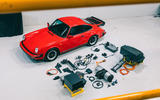The conversion of classic cars to run on electric power was once seen as a hobby industry, something done by people in their garage in the same way as other, one-off modified car projects.
Today, though, it is big business, with a constant flow of announcements about new companies either creating the powertrains themselves or converting classic cars. It’s a controversial subject among enthusiasts, but whether you agree with it or not, it is becoming a multimillion-pound business. It even grabbed the attention of David Beckham, who recently became a shareholder in Silverstone-based high-end conversion company Lunaz.
It is also an industry surrounded by a great deal of uncertainty when it comes to regulation, standards, safety and the question of cost versus value. With many classics too old to require an MOT, there are no proper rules about what can be done and the implications there might be for safety.
These are all issues that some companies are trying to address, including Zero EV, which supplies a number of well-known classic car conversion companies. Zero EV’s founder, Chris Hazell, is working on a range of ways to introduce industry standards.
His company is in a good place to do so, because it’s the first electric vehicle conversion operation to become a member of the National Franchised Dealers Association (NFDA).
This allows Zero EV to work with the organisation on creating standards. Hazell is also building an online database platform similar to those used by car makers.
The introduction of standards is something that Gerry Hughes, director of Swindon Powertrain, says he would definitely support. His company supplies electrical systems to a number of classic car conversion companies as well as engines for the British Touring Car Championship. He says that certification and homologation is all being done at a local level by the vehicle builders themselves but stresses that it is a very complex subject.

“What is good for one market isn’t necessarily good for another,” he said, pointing out that when it comes to conversions, the UK is more accepting than many other markets. Hughes would like to see the implementation of safe working practices and recommends that technicians attend annual workshops on high-voltage applications.









Add your comment